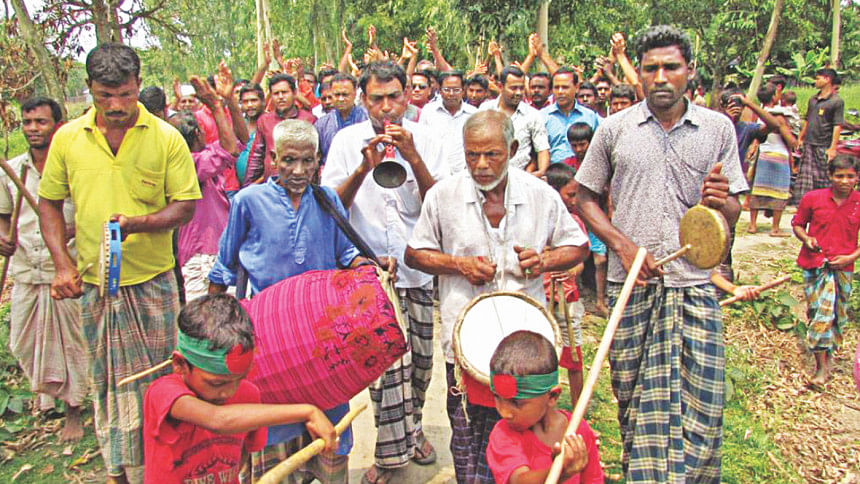All clear for land swap

Seeking to settle decades-old border issues with Bangladesh, the Indian Parliament yesterday unanimously passed a historic bill to operationalise the 1974 Land Boundary Agreement and its 2011 protocol.
Minutes after the bill's passage, Indian Prime Minister Narendra Modi spoke to Bangladesh PM Sheikh Hasina and described the bill's passage as a "historic milestone" in bilateral ties between the two countries.
"Spoke to Bangladesh PM Sheikh Hasina and conveyed my greetings to the people of Bangladesh on this landmark occasion," the Indian PM said in a post on social networking site Twitter.
Earlier, showing rare unanimity, all 331 members present in the 542-strong Lok Sabha, the Lower House of parliament, voted for the bill.
As the bill got through, Modi walked up to the Opposition benches to thank leaders, including Congress Chief Sonia Gandhi and its leader in the Lok Sabha Mallikarjun Kharge, for their support.
Speaking on the bill, Indian External Affairs Minister Sushma Swaraj, who moved it, said the only issue yet to be settled with Bangladesh was water-sharing, primarily relating to the Teesta river.
"The way in which we are now settling the land boundary issue, we will try to settle this issue also," she said.
Bangladesh High Commissioner to India Syed Muazzem Ali, who watched the debate and the bill's passage in the Lok Sabha, told The Daily Star later that Dhaka is expecting a visit by the Indian PM in the first week of next month.
He, however, hastened to add that no date was finalised yet.
Talking to Hasina after the bill's passage, Modi said the LBA "would contribute to a stable and peaceful boundary, better management and coordination of the border and will lead to enhanced security as well."
Modi, who posted a number of messages on Twitter, said, "Today a historic milestone has been reached in India-Bangladesh relations after the passing of the Constitutional Amendment by Parliament.
"This reflects the collective will of the nation to build constructive relations with our neighbours", he said in a separate post.
On Wednesday, the Rajya Sabha, the Upper House of the Indian parliament, passed the bill unanimously.
The bonhomie among India's ruling BJP and opposition parties over the LBA was evident in the fact that not a single "no" vote was cast when the bill was passed in the Rajya Sabha and the Lok Sabha.
The bill aims at giving effect to acquisition of territories by India and transfer of territories to Bangladesh and exchange of enclaves in line with the 1974 agreement.
The territories in Assam, West Bengal, Tripura and Meghalaya come under the ambit of the bill.
In Bangladesh, territories in Nilphamari, Feni, Moulvibazar, Kushtia and Panchagarh come under the domain of the pact.
During the nearly three-hour debate on the bill in the Lok Sabha, Sushma Swaraj said it was beneficial for both the countries, and that there would be a "notional" loss of territory without borders getting contracted.
She said India would get 510 acres of land while Bangladesh will receive 10,000 acres. "But these are notional figures as these areas are deep inside territories of the two countries. Our borders are not getting contracted."
She was responding to members' questions whether India will lose some territory.
Swaraj said the measure, apart from demarcating the boundaries, would also help check illegal immigration.
"A solution to the problem of illegal immigration is inherent in this legislation. With the land border now being decided [with the passage of the bill], the portions where there is no fencing will also get fenced," she said.
The maritime boundary between India and Bangladesh was settled last year through an international tribunal.
Refuting allegations of India's "big brotherly" attitude towards its South Asian neighbours, Swaraj said, "One is 'big brother' which symbolises arrogance. But there is also the 'elder brother' who is caring. Ours is a caring attitude. India will maintain the attitude of the 'elder brother' with our neighbours."
Swaraj made references to the 1974 LBA signed by Indira Gandhi and Sheikh Mujibur Rahman and its protocol inked during former Indian PM Manmohan Singh's Bangladesh visit in 2011 to pave the way for exchange of Bangladeshi and Indian territorial enclaves.
The Indian external affairs minister said she has been "transparent" in stating that her party BJP was earlier opposed to the bill. It was primarily because of concerns that Assam's interests would be adversely affected.
She said Assam Chief Minister Tarun Gogoi, who had earlier expressed some reservations on similar lines, wrote to the PM and her, urging the Centre to include the clauses relating to the state.
BNP'S REACTION
Meanwhile, the BNP last night thanked Modi, his government, and leaders of the political parties that played a vital role in the passage of the LBA bill.
Briefing journalists at party's Nayapaltan central office, BNP Spokesperson Asaduzzaman Ripon claimed Bangladesh would lose around 500 acres of land once the agreement is implemented. He, however, didn't elaborate on his claim.
Asked, he said the party would come up with details after going through the deal.

 For all latest news, follow The Daily Star's Google News channel.
For all latest news, follow The Daily Star's Google News channel. 



Comments